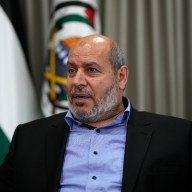Nusreta Sivac was a judge, but that didn’t protect her when enemy forces took over her city. Sivac was sent to a concentration camp and raped.
Sivac, a Bosnian Muslim in the town of Prejidor, is one of thousands of women that were raped during the 1992-1995 Bosnian war. According to a new report, Whose Justice?, released today by Amnesty International, Bosnia-Herzegovina’s governments have conveniently forgotten these victims: The perpetrators haven’t been brought to justice, and the women haven’t received reparations.
Unlike most of her fellow victims, Sivac is able and willing to speak about the trauma — she’s alive. Of the 36 women kept at the Omarska concentration camp, five are dead or missing. Inmates were only given one meal a day, Sivac recalls, and were often tortured so severely that other inmates heard their screams. But for Sivac, the nights were the worst. One night she, too, was raped.
Sivac knows the name of her tormentor: Zeljko Mejakic, the camp commander. But when the war ended, nobody arrested Mejakic. “I didn’t receive any help; just emotional support from my family,” Sivac tells Metro. “For a long time the rape determined my whole life.”
According to Amnesty, the men who committed Bosnia’s mass rapes have little to fear. “Many perpetrators of war crimes of sexual violence continue to enjoy impunity and often live in the same communities as their victims,” the human rights organization writes. Now Sivac, who never got her position as a judge back, is staging her own fight to bring Mejakic and his fellow rapists to justice.
Other testimonies:
Sabiha was raped by soldiers of the Army of Republika Srpska (VRS)
My eldest child got very sick. She had fever and she was begging for water. I had to leave the factory in which we were held. My father was forced to work near the factory with the other men. They were ordered to dig holes in the ground. When I went outside to get water, the soldiers caught me and it happened… I could not speak… I could not remember my name…I did not know who I was.
When I came back to the factory I could not say anything to my family. I could not even cry. If I could only cry… What was worst was that my father actually saw what was happening to me and he could not do anything. All the time this picture comes back to me. The factory, the memory of my father… When I work I manage to forget for a while about all this. But I can’t work as much as I used to, as my health is worse now. And I am worried, because I shout at my little daughter! I treat her badly. She cries a lot.
I cannot fight with myself anymore. I have no strength. Sometimes, I watch my past like a film. Scenes just come back to me. It disturbs my everyday life. So many years have passed and it is getting heavier and heavier. I cannot keep it inside anymore. Now I have realized I should have looked for help much earlier, but I did not know I could, I did not know whom to turn to.
Maja is a Bosnian Croat, but lives in a Serb dominated area. She said she was raped by a member of the Bosnian Serb Army (VRS) during the war.
Last year I went to the police station to see the file with my complaint. I asked a police officer to show me my file. He told me they did not have it anymore. I asked him “How was that possible? I reported the case in 1995.” He explained to me that they usually destroy all files after 10 years. “How is that possible?,” I asked him again. He said that that was due to the statute of limitation. I could not believe. Why? “It was a war crime. There is no statute of limitation on war crimes,” I said to him. He looked at me and said, “You know what? If there is anything important in the file we keep it. If it is not we destroy it.”
“So it was not important?,” I asked. “It was important to me. All of that was important! It is important to acknowledge what happened.”
















